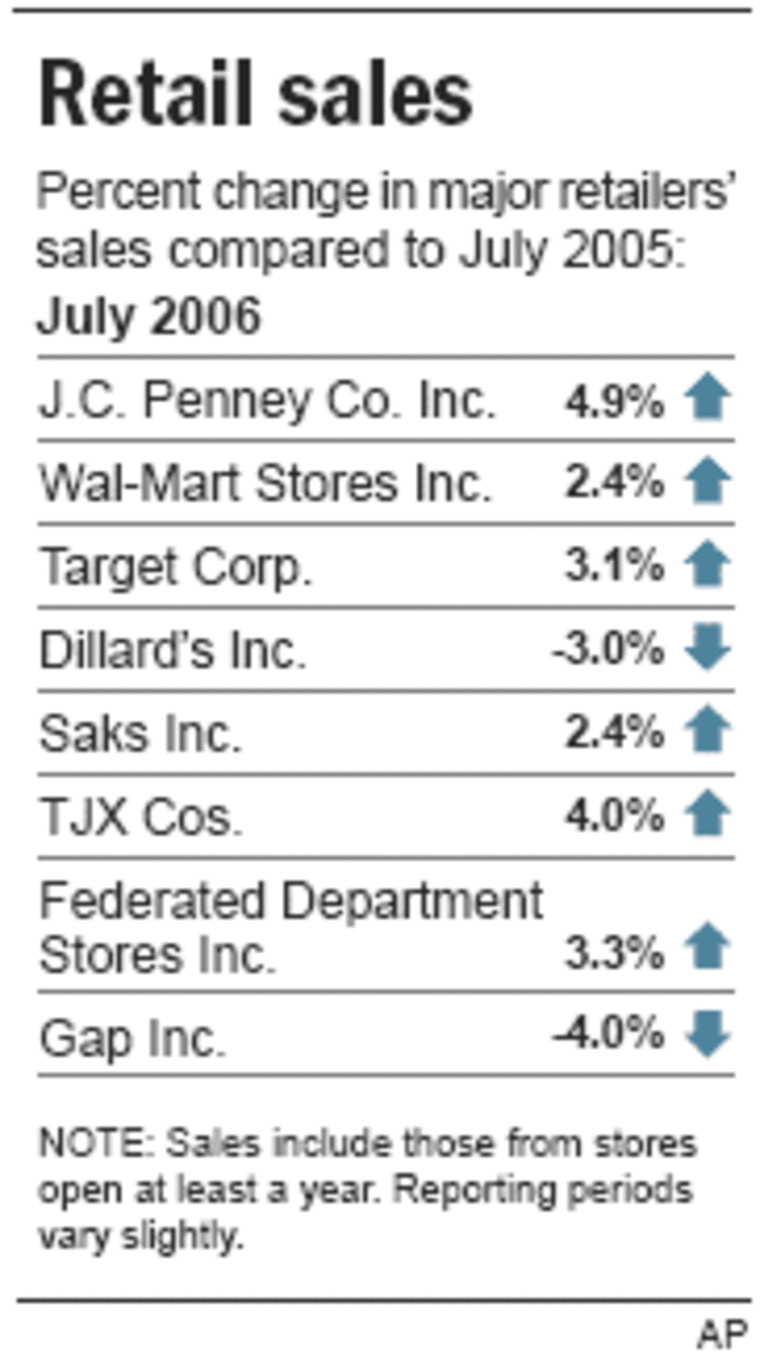Retailers scored solid sales and factories saw orders pick up, hopeful signs the economy isn't cracking under the pressure of high energy prices.
The latest batch of economic reports released Thursday suggests that although economic activity slowed in the last quarter, the economy remains in decent shape and doesn't appear headed for a backslide toward recession.
“All things considered, the economy is moving ahead. It is not knocking the cover off the ball, but it is not slumping, either,” said Richard Yamarone, economist at Argus Research.
Observed Ken Mayland of ClearView Economics: “The economy is no longer roaring ahead; maybe it is ambling.”
Economists were especially encouraged that the nation's big retailers reported good sales for July. Scorching heat drew shoppers to malls in search of summer clothing.
Stores that met or surpassed Wall Street expectations included Wal-Mart Stores Inc., Limited Brands Inc., Nordstrom Inc. and J.C. Penney Co. Inc.

Yet, the outlook for the back-to-school season remained uncertain as rising gasoline prices and higher borrowing costs are still expected to challenge shoppers.
Separately, the Commerce Department reported that new bookings to the nation's manufacturing sector rose by 1.2 percent in June, the most since March, but not as strong as the 1.7 percent rise economists were forecasting.
All the strength reflected demand for "durable" goods, including transportation equipment, computers, and fabricated metal products. Orders for "nondurables" such as food and chemicals, dipped.
In more economic news:
Service sector expansion
Activity in the nation's service sector expanded in July, though the pace wasn't as brisk as in June.
The Institute for Supply Management, a research group based in Tempe, Ariz., reported that its index of activity in the service sector clocked in at 54.8 last month, down from 57.0 in June. Economists were expecting a stronger performance. A reading of 50 or more indicates expanding activity, while below 50 indicates shrinking activity.
Job market solid
The number of people signing up for unemployment benefits climbed last week but still pointed to decent conditions in the nation's job market.
New applications filed for unemployment insurance rose by a seasonally adjusted 14,000 to 315,000, the highest since early July, the Labor Department said.
Although the level of claims was higher than the 308,000 economists were expecting, it still suggested the job market remains stable. A year ago, new claims stood at 318,000.
Economists, meanwhile, believe job growth perked up in July. They are forecasting a gain of around 145,000 new jobs, up from a disappointing 121,000 added in June. The unemployment rate is expected to hold steady at 4.6 percent. The government releases July's employment report on Friday.
Economic growth subdued
Economic growth in the April-to-June quarter slowed to a 2.5 percent pace, less than half the 5.6 percent growth rate registered in the first quarter. Growth through the rest of this year is expected to be subdued.
At the same time, inflation has moved higher — presenting a tricky situation for the Federal Reserve.
Federal Reserve policymakers meet next week to examine interest rate policy, and economists are divided over the outcome. Some believe the Fed will leave rates alone, taking its first break after tightening credit for more than two years. Others, however, predict another bump up will be needed to keep inflation in check.
Fed Chairman Ben Bernanke told Congress in July that he and his colleagues are concerned about rising prices for energy and other things but are hopeful that slower economic activity will lessen inflation pressures.
The Fed doesn't want to push up rates too high and cripple the economy. On the other hand, it doesn't want to let inflation get out of control by not pushing rates up enough.